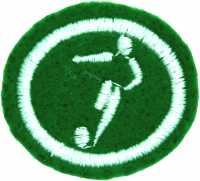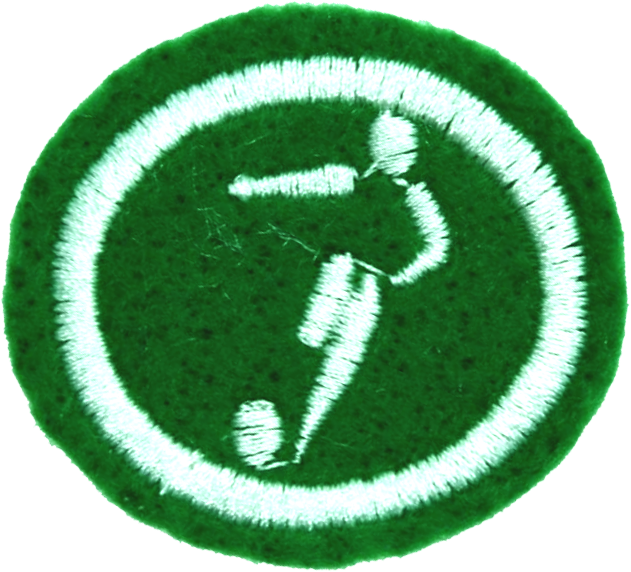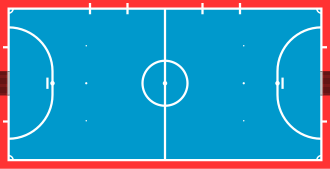Difference between revisions of "AY Honors/Futsal/Answer Key/pt-br"
(Created page with "</noinclude>") |
(Created page with "thumb|Um campo de futsal") |
||
| Line 64: | Line 64: | ||
{{CloseReq}} <!-- 2 --> | {{CloseReq}} <!-- 2 --> | ||
{{ansreq|page={{#titleparts:{{PAGENAME}}|2|1}}|num=3}} | {{ansreq|page={{#titleparts:{{PAGENAME}}|2|1}}|num=3}} | ||
| − | <noinclude> | + | <noinclude></noinclude> |
| − | </noinclude> | + | <!-- 3. Quais as diferenças entre futsal e futebol de salão? --> |
| − | <!-- 3. | ||
| − | |||
<div lang="en" dir="ltr" class="mw-content-ltr"> | <div lang="en" dir="ltr" class="mw-content-ltr"> | ||
Revision as of 19:08, 10 June 2021
1
1a
1b
1c
1d
1e
1f
2
The YMCA spread the game immediately throughout South America. It was easily played by everyone, everywhere, and in any weather condition, even in winter, without any difficulty, helping players to stay in shape all year round. These reasons convinced João Lotufo, a Brazilian, to bring this game to his country and adapt it to the needs of physical education.
Shortly after, a unique tournament was organized. It attracted some interest in South American media, which regularly began to follow futsal. In particular, it was the journalist José Antônio Inglêz who passionately contributed to the rapid spread of the game, as well as being credited as the man who coined the name “futsal” to define the sport.
3
4
Futsal currently has two governing bodies: Asociación Mundial de Fútbol de Salón (AMF) and Fédération Internationale de Football Association (FIFA). AMF is the successor organization to the original governing body. FIFA later took an interest in futsal. However, talks between FIFA and AMF to reconcile governance were not successful. FIFA organizes its own separate competitions.
5
5a
The action of delivering the ball to another player, as accurately as possible. It can be short, medium or long, depending on the distance. According to the trajectory, it will be ascending, descending, parabolic, or at ground level and according to the direction: deep, lateral, delayed and diagonal.
5b
5c
This move serves to deceive opponents by either kicking, passing or driving, usually used against defendors.
5d
5e
5f
This is a very much used action during a game, with the aim of receiving the ball from another player and controlling it.
5g
By driving the ball, it progresses from one side to another of field with the use of the feet.
5h
5i
6
7
7a
7b
7c
7d
8
Summary of rules
| Length of the field | minimum 25 m × 16 m (27 yd × 17 yd), maximum 42 m × 25 m (46 yd × 27 yd). |
| Ball | Size 4, circumference 62–64 cm (24–25 in), weight between 400–440 g (14–16 oz) at the start of the game.
Dropped from a height of 2 m (6 ft 7 in), the first rebound must not be lower than 50 cm (20 in) or more than 65 cm (26 in). |
| Time | There are two periods of 20 minutes with time stopping at every dead ball. Between the two periods there is a break of 15 minutes. Each team may use one time-out per half, which lasts one minute. Some lower leagues and tournaments use 24 minute periods with running time. |
| Number of players | There are five players for each team in the field, one of them as goalkeeper, and a maximum number of 12 players that can be used each match. Substitutions are unlimited and on-the-fly. |
| Fouls | All direct free kicks count as accumulated fouls. A direct free kick is awarded for kicking, tripping, charging, jumping, pushing, striking, tackling, holding, spitting, and deliberate handling. Indirect free kicks, such as playing dangerously and impeding, do not count as accumulated fouls. A team is warned by the referee when they commit five accumulated fouls in a half. |
| Cards | A yellow card is shown for unsporting behavior, dissent, time wasting, encroachment, persistent infringement, and illegal subbing. A red card is shown for serious foul play, violent conduct, spitting, illegally denying an obvious goal-scoring opportunity, abusive language, and receiving a second yellow. Red carded players are ejected from the game and their team must play short for two minutes or until the other team scores a goal. |
| Free kicks | Taken from the spot of the infringement or on the line of the penalty area nearest the infringement (indirect only). All opponents must be at least 5 m away from the ball. The kick must be taken within four seconds or an indirect kick is awarded to the other team. |
| Kick from the second penalty mark | Awarded when a team commits 6 or more accumulated fouls in a half. Second penalty mark is 10 m (11 yd) from the goal, opponents must be behind the ball, goalkeeper must be at least 5 m (5.5 yd) away. |
| Penalty kick | 6 m (6.6 yd) from the center of the goal for fouls inside the 6 m (6.6 yd) goalkeeper's area. |
| Goalkeeper | When in possession of the ball, the goalkeeper has 4 seconds to get rid of the ball. If the ball is kept too long, the referee will give an indirect kick to the other team. The goalkeeper may play freely when in the opponent's half. |
| Goalkeeper pass-back restriction | Once the goalkeeper has released the ball either by kicking or throwing, the goalkeeper may not touch it again until the ball goes out of play or is touched by an opponent. The sanction for violation is an indirect free kick. The goalkeeper may receive the ball freely when on the opponent's half |
| Kick-in | A kick-in is used instead of a throw-in. The player must place the ball on the touchline or outside but not more than 25 cm (9.8 in) from the place the ball when out of play. The ball must be stationary and the kick-in must be taken within 4 seconds from the time the player is ready. During kick-in, opponents must stand at least 5 m from the ball. If four seconds elapses or an illegal kick is taken, the referee will award a kick-in to the other team. It is not allowed to score directly from a kick-in: the goal is valid only if someone else touches the ball before it enters in goal. |
| Goal clearance | A goal clearance is used instead of a goal kick. The goalkeeper must throw the ball with their hands and it must leave the penalty area within four seconds. If goal clearance is taken illegally the goalkeeper may retry, but the referee will not reset the count. If four seconds elapses, the other team gets an indirect kick on the penalty area line. |
| Corner kick | The ball must be placed inside the arc nearest to the point where the ball crossed the goal line and the opponent must stand on field at least 5 m (5.5 yd) from the corner arch until the ball is in play. The corner kick must be taken within 4 seconds of being ready or else a goal clearance will be awarded to the other team. The ball is in play when it is kicked and moves. |
| Referees | For international matches, there must be two referees: one (first referee) is positioned on the touchline near the timekeeper table and communicates with the timekeeper, while the other (second referee) is in the opposite side of the field. At the timekeeper table there is a timekeeper and a third referee, who controls the teams' benches.
|
9
10
10a
10b
10c




